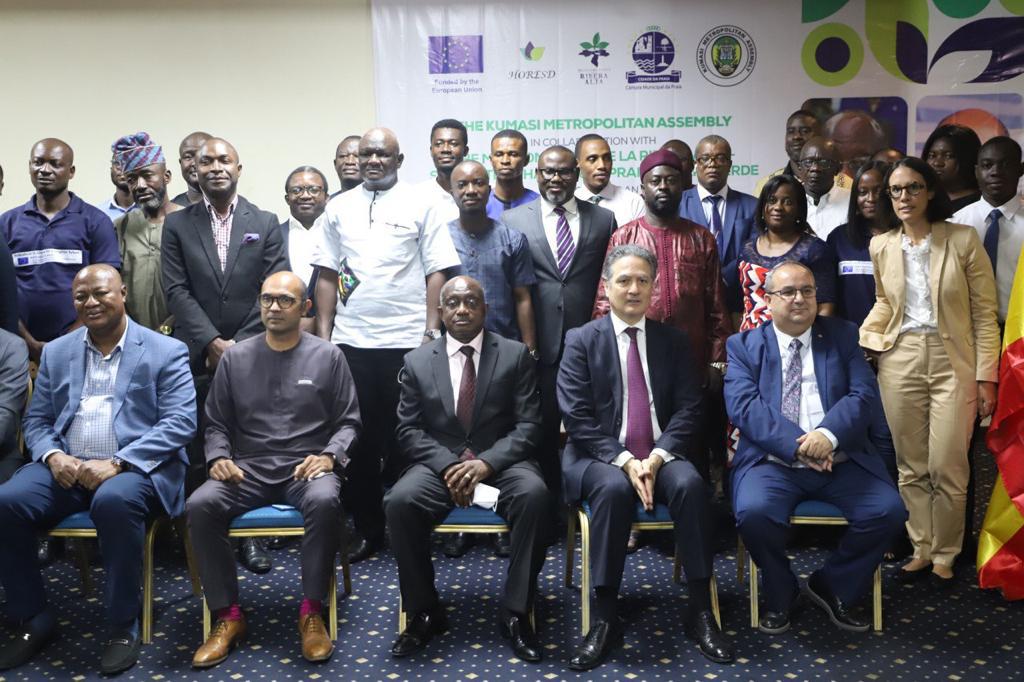The European Union(EU), has provided a grant of €2.5million to the Kumasi Metropolitan Assembly(KMA), to help manage solid waste and improve service delivery in the metropolis.
The project, dubbed: “Holistic Reinforcement for Sustainable Development (HORESD), would be implemented in 30 months.
It is co-partnered by Mancomunitat de la Ribera Alta in Spain, and the Chamber of Praia in Cape Verde.
Key components
Key components of the project are the establishment of four composting stations, and two eco-stations, that would be managed by cooperatives of persons who are at risk of social exclusion.
Other components are the creation
The project also includes the establishment of a Sustainable Entrepreneurship School, that would help a wide range of entrepreneurs in Kumasi to develop green jobs; as well as a comprehensive study of converting waste to energy.
The overarching objective of the HORESD project, is to improve the delivery of public services through effective capacity building in both the structural and decision making systems of local authorities in the KMA, the beneficiary city.
Launch
Speaking at the launch of the HORESD project in Kumasi on Wednesday, March 16, 2022, H.E. Irchad Razaaly, Ambassador and Head, European Union delegation to Ghana, said the project seeks to strengthen Kumasi’s capacity to provide public service, giving priority to an integrated management system of solid urban waste.
Again, he noted that it will help boost the circular economy in the metropolis, with special emphasis on incorporating the disadvantaged or those at risk of social exclusion, especially women, young people, and people with disabilities.
Present at the launch were Mr Simon Osei Mensah, the Ashanti Regional Minister; Mr Samuel Pyne, the Metropolitan Chief Executive of Kumasi; and H.E. Javier Gutierrez, Spain’s Ambassador to Ghana.
Government’s commitment
Mr Osei Mensah lauded the project, stating that it was in line with President Akufo-Addo’s quest for MMDCE’s to leverage on Sustainable Development Goal (SDG) 17, to forge north–south partnerships that will contribute to Ghana’s achievement of the SDGs by 2030.
He noted that in Kumasi, over 1,500 tons of waste was generated daily, creating sleepless nights for the city authorities in terms of its management and that the project would go a long way to augment the government’s effort in managing solid waste in the metropolis.
Job creation
Mr Osei Mensah, said while urban solid waste was a resource for job creation and sustainable income generation for some households in countries like Germany, Spain and Sweden, it was rather a headache and financial drain on the city authorities in developing countries like Ghana.
He said it was quite unfortunate, that citizens resorted to unregulated dumping of solid waste into drains, streets and practised open burning which remained a headache to city authorities.
“While these practices create serious health, safety and environmental consequences, the poorly managed urban solid waste serves as breeding grounds for disease vectors and contribute to global climate change through methane generation”, he added
The Minister was confident that under his watch, the project will be scaled up to other cities within the Ashanti Region as well as replicated in other regions of Ghana.
Waste management
On his part, Mr Samuel Pyne, noted that waste management in the metropolis consumes almost three-quarters of the Internally Generated Funds mobilized by the City Council, and that despite all these financial investments in the management of solid waste, the city of Kumasi was still bedevilled with indiscriminate disposal of solid waste.
“We’ve tried several waste management strategies, ranging from free disposal of waste by households, pay-as-you dump, night cleaning to the installation of dustbins along the streets, all to improve waste management”, he lamented. He said unfortunately the results realized do far have been below expectation.
Source: Graphic Online





